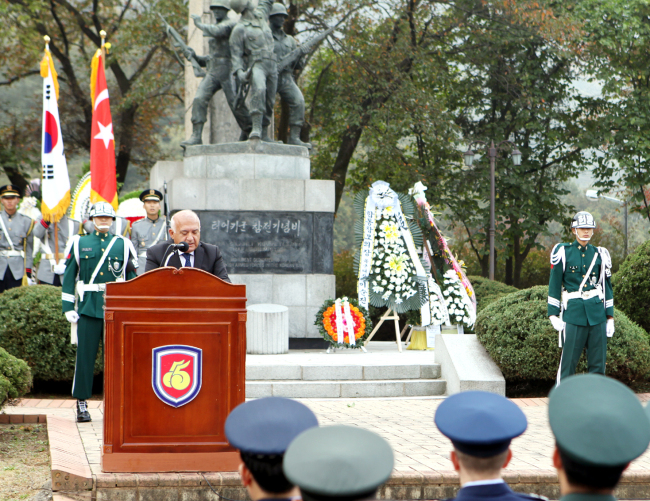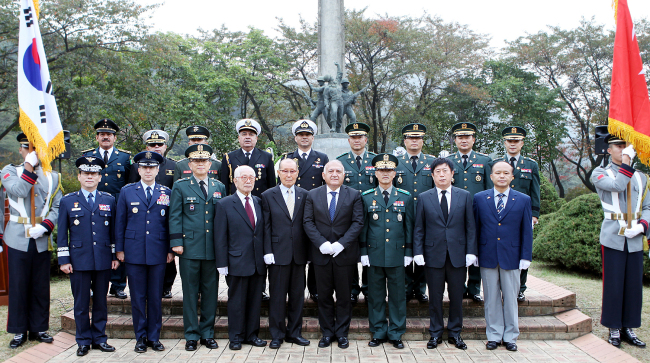Marking the 66th anniversary of the Turkish Brigade’s arrival here to fight in the Korean War, the Turkish Embassy, the 55th Republic of Korea Infantry Division and the city of Yongin commemorated the sacrifices of Turkish soldiers last week.
“When South Korea was invaded by the communist North in 1950, Turkey did not hesitate to join forces with the United Nations Coalition Forces to safeguard the country’s sovereignty, liberty and democracy,” said Turkish Ambassador to Korea Arslan Hakan Okcal at a commemorative ceremony in Yongin, Gyeonggi Province, Tuesday.
In September 1950, Turkey -- the second country to answer the UN call after the US -- dispatched a brigade of 5,000 soldiers to Korea, with the total number of Turkish troops serving in Korea stretching to 20,000.
 |
Turkish Ambassador to Korea Arslan Hakan Okcal (behind podium) speaks at a ceremony next to the Turkish Monument in Yongin, Gyeonggi Province, Tuesday, to commemorate the 66th anniversary of the Turkish Brigade’s participation in the Korean War. (Turkish Embassy) |
The unit’s fiercest battle of the war took place on the hills of Kumyangjang-ni near Yongin from Jan. 25-26, 1951, where the Turkish Brigade repulsed a Chinese force three times its size. Turkey inflicted 1,735 casualties on the enemy while suffering 12 losses, sending “a clear message to the enemy that they could not win the war,” according to the embassy.
The Kumyangjang-ni Offensive was made in retaliation to the Battle of Kunuri along the Chongchon River in the northwestern part of North Korea from Nov. 25 to Dec. 2, 1950.
At Kunuri, the Turkish troops came under a surprise enemy attack, and over the next three days and nights, managed to break the overwhelming encirclement and delay the Chinese advance. Their resistance allowed the organized retreat of allied troops, although Turkey suffered high casualties.
“Our brave soldiers did not hesitate to shed their blood and sacrifice their lives,” the ambassador said, noting that Turkey lost about 1,000 troops during the war, proportionally the highest casualty rate among the allies.
Okcal also thanked Korea for “always remembering and honoring” Turkey’s vital contribution. The Turkish Monument in Yongin, constructed in 1974, is a “solid symbol” of Korea’s respect for Turkey’s sacrifice, he stressed.
 |
Members of the Turkish Embassy, the 55th Republic of Korea Infantry Division and the city of Yongin (Turkish Embassy) |
“The Turkish soldiers showed their heroism to the entire world,” said Paik Sang-ki, former interpreter for the brigade and retired Korean diplomat, in a speech at the venue. “Today’s Korea is solid proof that Turkey’s sacrifice in the war was not in vain.”
“Our participation has led to a unique friendship between the Turks and Koreans that we today call a ‘blood-sealed brotherhood,’” Okcal noted. “There is a special place for Korea in the hearts and minds of Turks, and I believe it is also the same for Koreans. During the last three years of my ambassadorship here, I have witnessed your warmth and hospitality toward my country.”
The two nations have “gone a long way since the war ended,” the diplomat said, adding they were now important partners on the regional and global stages through the “vibrant, multidimensional and healthy relationship.”
The event also gathered Yongin Mayor Jung Chan-min, Commander of the 55th Infantry Division Maj. Gen. Lee Chang-hyo, United Nations Command Military Armistice Commission Senior Member Maj. Gen. Cho Yeong-jin, Deputy Chief of Staff for UN Command and United States Forces Korea Maj. Gen. James Slife, ROK Member of UNCMAC Brig. Gen. Song Young Hoon, United Nations Korean War Allies Association President Chi Kap-chong, as well as other ROK Army officials, diplomats, military attaches, Korean graduates of the Turkish Brigade’s Ankara School, Korean War veterans and Turkish citizens living in Korea.
By Joel Lee (
joel@heraldcorp.com)








![[Today’s K-pop] Blackpink’s Jennie, Lisa invited to Coachella as solo acts](http://res.heraldm.com/phpwas/restmb_idxmake.php?idx=644&simg=/content/image/2024/11/21/20241121050099_0.jpg)
